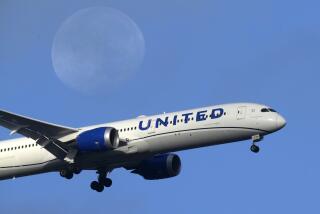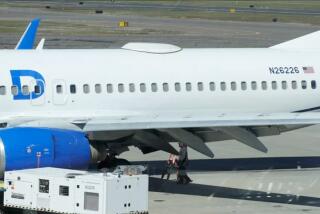Retirees’ Futures Up in Air
After 36 years as a United Airlines baggage handler, Reggie Martinez of Torrance retired last year with hopes of leaving the airline’s problems behind him.
That idea evaporated a week ago when the airline’s parent, UAL Corp., said it planned to stop making pension-fund contributions to conserve cash while it tried to emerge from Chapter 11 bankruptcy protection. The move sparked concern that Martinez and others could see a cut in their retirement benefits.
“This is making a lot of people worried,” said Martinez, 61, who spent most of his career at Los Angeles International Airport, where United is the busiest operator. “I gave my family a fairly decent living -- and now there’s a big question mark about what’s going to happen.”
The questions about United’s employee pension funds spilled into federal court in Chicago on Thursday when Martinez’s union, the International Assn. of Machinists, sued UAL and its top executives, alleging that they broke their fiduciary duty to retirees. The union represents 37,000 active and retired United baggage handlers, ramp workers and other ground employees.
“United Airlines must get the message that they cannot abandon employee benefits at will,” Randy Canale, president of United’s machinists chapter, said in a statement. Canale also is a UAL director, but he skipped a board meeting this week in protest.
The pension plans cover about 58,000 retirees and current and former United employees who are vested, United said.
UAL already has missed a $72.4-million payment scheduled for July 15, angering United’s unions and raising red flags at the Pension Benefit Guaranty Corp., the federally chartered agency that insures corporate pension plans.
They fear UAL might ultimately seek Bankruptcy Court approval to terminate its pension plans altogether, which would dump their financial obligations on the agency.
If the agency were to take over, it would immediately pick up the payments to beneficiaries. But the retirees might face reductions of their benefits because the government agency insures pension plans only up to set limits.
United called the union lawsuit “baseless,” and said it moved to stop the pension-fund contributions “to preserve our liquidity and flexibility as we work to secure exit financing.” UAL is trying to get additional cash after the federal government turned down its request for a $1.6-billion loan guarantee last month.
On Thursday, officials of the federal pension agency met with United executives to discuss the airline’s strategy. The meeting came after Bradley Belt, the agency’s executive director, wrote to UAL Chief Executive Glenn Tilton to express “great concern” about UAL’s move.
United’s pension plans are $6.2 billion short of what’s needed to fund future retiree obligations, and the airline faces $4.1 billion in required contributions through 2008.
Less clear is how much risk Martinez, and other retirees, face if United keeps withholding its contributions or the pension agency is forced to take over the airline’s retirement plans.
If United terminated its pension plan in 2004, for example, the maximum amount a 65-year-old retiree could receive would be $44,386 per year. That’s the maximum for any U.S. company, no matter whether the individual retires today or 20 years from now, the agency said.
In other words, the maximum pension benefit is set on the date that the plan is taken over by the agency, not on when the individual retires.
UAL hasn’t yet made a long-term decision about its pension plans, and the plans continue to pay benefits without interruption.
If the agency inherited United’s pension mess, some United retirees would see little or no cut in their benefits if they retire at age 65, said Stephen Skonieczny, a benefits expert and partner at law firm Dechert in New York.
That’s because many retired United flight attendants, ramp workers and others earned less than $50,000 a year when they retired and their pensions are paying out less than the agency’s cap, he said.
However, United workers who retire before the age of 65, such as Martinez, might get lower benefits from the federal pension agency than they expected from the airline, the agency’s rules indicate.
United’s former pilots also could see reduced benefits because they typically earn six-figure salaries with hefty pensions. “The people who are going to get hurt are the pilots,” Skonieczny said.
The agency has other limits as well. Although some airline plans offer full retirement benefits to those leaving service at a younger age -- say, 55 -- the agency subjects early retirement benefits to stricter limits.
Meanwhile, UAL on Thursday reported a second-quarter loss of $247 million, but that was much narrower than the $623-million loss it posted a year earlier.
United’s second-quarter load factor -- the percentage of its seats filled with passengers -- climbed to 82% from 77% a year earlier. But United, like many other airlines, continued to suffer from widespread fare cutting among the airlines.
Staff writer Kathy Kristof and Times wires services contributed to this report.
More to Read
Inside the business of entertainment
The Wide Shot brings you news, analysis and insights on everything from streaming wars to production — and what it all means for the future.
You may occasionally receive promotional content from the Los Angeles Times.











